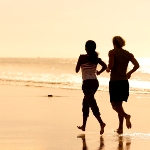| Q |
Better to Run Barefoot?
What do you think of running barefoot? I've read that you're less likely to get injured if you don't wear shoes.
|  |
| A |
Answer (Published 9/19/2011)
| |
In the running world there appears to be quite a controversy developing about whether it's best to wear shoes or to train yourself to run barefoot. A number of champion runners have made their mark in bare feet, and obviously, before there were shoes, humans who ran did so barefoot. The main argument for barefoot running seems to be that it causes you to land on your forefoot rather than the heel, as you do when running in shoes. Landing on the forefoot is supposed to be less jarring and therefore less likely to lead to injuries
Related Weil Products
Dr. Weil on Healthy Aging for Fitness - It's never too late to get fit! Promote a healthy weight, increase your energy, encourage better rest and feel great with a regular exercise program designed for your needs and capabilities. The Dr. Weil on Healthy Aging online plan has all you need - sign up today and get 14 days free!
The question of whether running barefoot leads to fewer injuries was heatedly debated at the American College of Sports Medicine's 2011 annual meeting. I doubt that those on either side of the argument were satisfied with the conclusions. Barefoot runners are convinced that they're less likely to hurt themselves. That may be true if you grew up not wearing shoes and always ran barefoot. But you can hurt yourself in the process of adjusting to barefoot running if you're used to shoes. A Harvard University website notes that there have been no studies of risk of injury with barefoot running, but it does list hypothetical advantages, including fewer repetitive stress injuries, especially stress fractures, plantar fasciitis, and runner's knee. Other advantages may be a strengthening of the foot muscles, and the use of less energy. And running barefoot makes some people feel good.
Before you get that far, you've got to develop calluses on your feet; until you do, the Harvard site advocates wearing light, flexible shoes. (You can get so-called "barefoot running shoes.") In addition, switching from shoes to bare feet requires a change in running form that isn't automatic. It demands a shorter stride than most runners are accustomed to, for instance, and making the change may not be easy - the Harvard site recommends a slow transition to avoid injury
Another issue is where you run and the likelihood of encountering glass, stones and other debris. If road surface safety is not an issue and barefoot running appeals to you, there's no reason not to try it. I wouldn't count on it to prevent injuries, though. Until we have studies to tell us whether or not barefoot running is actually safer, I would assume that you're just as likely to sustain an injury running barefoot as you would be wearing shoes.
Andrew Weil, M.D.
| ||
Dedicated to the way we're supposed to run. Let's balance diet, technique, training, recovery, and fun!
Monday, September 19, 2011
Better To Run Barefoot?
Subscribe to:
Post Comments (Atom)
No comments:
Post a Comment